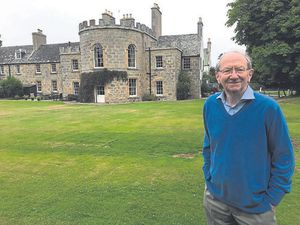Arthur Walkington Pink was born on 1 April 1886 – in Nottingham beside the River Trent and in what was then accounted ‘the richest country of the world’. Queen Victoria had reigned over a rising prosperity for half a century, and the government of Robert Cecil, third marquis of Salisbury, ruled a quarter of the earth.
Nottingham, with a population at this date of about 200,000, had not been left out of the industrial revolution. There were several iron foundries, and local manufactured products included lace, clothing and bicycles.
Even so the surrounding county remained largely unspoiled. A large part of its fifty miles by twenty were taken up with arable farming — corn, wheat, barley and oats — while such ancient woodlands as Sherwood Forest still remained.
Warning voices
The Christian churches in general shared the national mood of optimism. Voices raised in warning were few, yet they would be remembered long after spokesmen for popular opinion were forgotten.
Approaching the conclusion of his long ministry, J. C. Ryle, Bishop of Liverpool, was ready to assert ‘that in hardness, unbelief, superstition, and self-righteousness, the Christian Churches, as a whole, are little better than the Jewish Church of our Lord’s time’.1
Among the few who agreed with Ryle was C. H. Spurgeon. In the month Pink was born, the fifty-one-year-old Baptist preacher wrote in his magazine The Sword and the Trowel an article entitled, ‘A word for the hour’.It included the words:
‘An abiding consolation in these evil days is to be found in the fact that the Holy Spirit is working in the same manner as ever. A conversion to-day bears all the marks which authenticated a conversion five hundred years ago…
‘It matters not how much the wise men of this world deride the gospel of our Lord Jesus, it still arouses the careless, guides the despondent, renews the guilty and sanctifies the believing…
‘While this is the case, what means this clamour for advanced thought? Can there be an advance upon a revelation which is complete? Is there anything better than Jesus Christ, the same yesterday, today, and for ever? In patience let us possess our souls, resting not in talent and learning and influence for the progress of the gospel, but in the Holy Spirit alone.
‘He can raise up leaders of eminence if other Pauls are needed. He can find learned pens if other Augustines are required. He never fails, not even pauses, for lack of instruments.’
Family
Arthur Pink’s parents may have read these words for it was into such homes that the 20,000 copies of Spurgeon’s monthly were circulated. His father, Thomas Clement Pink, was some thirty-eight years of age at the time of Arthur’s birth, his own birth having taken place near Nottingham in 1849.
Of Thomas Pink’s life very little is known. It is clear that he had passed through sorrow, for the census of 1881 gave his dwelling as 15 Cobden Road, Chesterfield, at which time he was married to Sarah Augusta, aged twenty-eight, who came from County Sligo in Ireland.
Sarah Pink must have died soon after that date, for by 1884 Thomas Pink had moved to Nottingham where he married Agnes Ann Hunt of Belper in that year. When their eldest son, Arthur, was born two years later, they were living at 4 Claremont Terrace, Francis Street, Nottingham.
Christian commitment
Of his father, Arthur wrote: ‘The father of the writer was an exceptionally busy business man: so busy that for over thirty years he never had more than three consecutive days’ holidays. He was a corn merchant, and after returning from market attended to much of the clerical work in person, so that for years he did not cease till11:50 Saturday night’.
2
The census of 1901 gives Thomas Pink as fifty-two years of age, his wife as fifty-one, and the family as containing three children: Arthur (14), Frank (13), and Agnes Louise (11).
Arthur Pink tells us more about the Christian commitment of his parents, including the fact that his mother devoted him to Christ before he was born. The Bible was taken very seriously.
‘We had’, he recalled in later years, ‘a daily delivery of mail, including Sunday, which often contained important business letters, but none were opened on the Lord’s Day. No Sunday newspapers ever entered our home — not even when the Boer war was on.
‘When we were little all our toys were put away on Saturday night and pictorial editions of Bunyan’s Pilgrim’s Progress and Foxe’s Book of Martyrs, etc. were brought out.’
3
Of course, such practices were followed in many Victorian homes, but in the house in Claremont Terrace the discipline was accompanied by his parents’ warmth of devotion to Christ.
A Sabbath well spent
‘As a boy’, writes Pink again, ‘I several times asked my father why he spent so much pains in shining his shoes, and each time he answered, “I am polishing them as though the Lord Jesus was going to wear them”.’
Pink further recalls: ‘Yet [my father] did not lie in bed Sabbath mornings, but took his children to hear God’s Word preached. He did not send them to “Sunday school” while he took a nap in the afternoon, but gathered us around him and spent a couple of hours in reading to us from the Scriptures, from Foxe’s Book of Martyrs, Bunyan’s Pilgrim’s Progress,etc. Every day he conducted family worship, and when we were too little to sit up for the evening our godly mother took us around her knee and prayed with us.’
In later years Pink was often to quote a verse which he first learned in childhood:
A Sabbath well spent
brings a week of content,
and strength for the toils of the morrow,
but a Sabbath profaned,
whate’er may be gained,
is a certain forerunner of sorrow.
4
Childhood
Our knowledge of Pink’s childhood and youth is practically a total blank. Whether he attended the nearest local school to Newstead Grove; whether he sat with many other youths in the summer sunshine at Trent Bridge to watch cricket; whether he had one of Nottingham’s latest bicycles with which to ride in Sherwood — all these and other such things are unrecorded.
Academically, Pink’s education appears to have been good and, unlike many children of that period, he stayed at school until he was sixteen. Certainly his later life shows that he had a trained and disciplined mind, and that such subjects as English literature and general history were ones with which he was familiar.
He appears to have had a particular interest in music and could speak of himself as ‘a trained musician, both vocally and instrumentally’.
5
What is clear is that as Arthur, his younger brother Frank, and sister (known by her second name Louise) grew up, their early training in the Scriptures showed no signs of bearing fruit. Slowly all three children appear to have drifted into lives of unbelief.
Godless companions
In Arthur’s case it seems he was influenced by young people who had no such background as his own. In later memories of this time he refers to ‘the godless companions of our youth’, and says that during energetic and thoughtless days among them there were ‘a number of occasions when he was in imminent peril, brought face to face with death’.
Whatever these escapades were, they were probably unknown to his parents. But to their grief there was another development in his life that they could not miss. Not only did their eldest son turn from their faith, he turned to Theosophy.
Theosophy is a cult which, although only formed into a Society in 1875, claims a special knowledge (theosophia – divine wisdom) which is supposedly preserved from generation to generation by a brotherhood of initiates.
At the beginning of the twentieth century its best-known British publication, the monthly magazine Lucifer,indicated clearly enough its anti-Christian nature. Its leading journal The Theosophist,at that time published monthly at the Society’s headquarters in Madras, India, promoted in esoteric form the ‘wisdom’ of eastern religions, including belief in reincarnation.
While denying the personality of God (and the supernatural in Christianity), Theosophy claimed to be able to unify all religions and to establish a universal brotherhood. Its main ‘messenger’ in the nineteenth century was the Russian, Helena Blavatsky (1831-1891), and she was followed by Annie Besant (1847-1933), who left her clergyman husband in 1873 for a life in politics, mysticism and eastern religions. From 1907 to her death she was President of the Theosophical Society


















